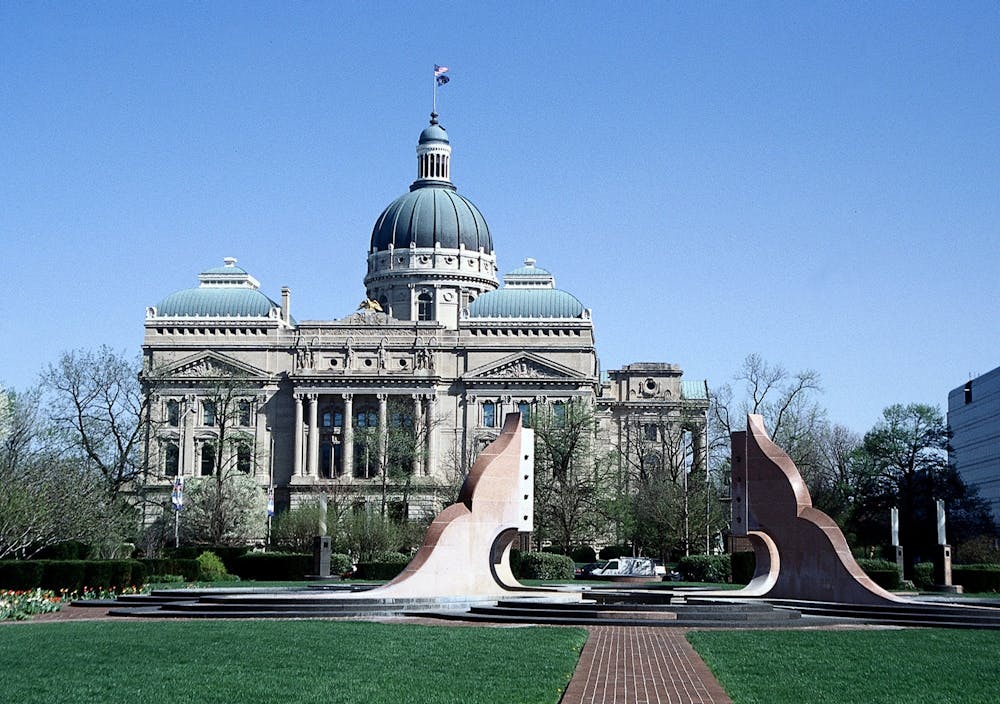Elections for the 25 out of 50 seats in the Indiana Senate and 100 seats in the Indiana House of Representatives will take place Nov. 3.
The Indiana Senate and Indiana House of Representatives make up the Indiana General Assembly, the bicameral legislative branch of the state of Indiana. The legislative branch works with the governor to create laws and a state budget. Both meet in the Indiana Statehouse in Indianapolis.
The Indiana state legislature also draws congressional and state legislative district lines after the completion of the United States census. The governor can veto proposed district lines. This year is a census year, so candidates elected this year will draw district lines that will exist for 10 years.
State legislators also make decisions that directly affect communities. Hoosiers can research the candidates running in their legislative districts to stay up to date before heading to the voting booth or mailing in a ballot this November.
Indiana Gov. Eric Holcomb rescheduled the state's primary election from May 5 to June 2 due to the coronavirus pandemic. Both major political parties canceled in-person conventions in favor of moving forward virtually.
Senators in Indiana’s General Assembly serve for four years with no term limit, while Representatives serve for two years with no term limit.
Indiana has had a Republican trifecta since 2011, meaning the party controls the majority of both the Senate and the House as well as the governorship, according to ballotpedia. Before November 2010, the Indiana House of Representatives had a majority of Democrats, so control of the General Assembly was divided between the two parties.
There are currently 40 Republicans and 10 Democrats in Indiana's state Senate. There are 66 Republicans and 33 Democrats along with 1 vacant seat in the Indiana House of Representatives. According to Indiana Code, vacancies in the Indiana General Assembly are filled by appointment from the state committee of the political party of the last incumbent, or by special election if the last incumbent was an Independent.
Eighteen Republican incumbents are running for reelection in the Indiana state Senate, two of whom are uncontested. Five Democratic incumbents are running, all of whom are uncontested. In the House there are 62 Republican incumbents running for reelection with 16 uncontested and 30 Democratic incumbents with 12 uncontested.
Democrat Ronald Saunders III is running against Republican Scott Baldwinin Senate District 20. Neither candidate is an incumbent for the position, meaning this race does not favor an individual of a certain party.
Saunders’ campaign plans to focus on education, healthcare, police reform, equal rights, infrastructure, cannabis legalization and gun sense. Baldwin’s platform revolves around protecting individual rights, creating jobs, balancing the budget and holding the line on taxes.
Previous incumbent, Republican Victoria Spartz is running for a seat in the U.S. House of Representatives for Indiana's 5th Congressional District against Democrat Christina Hale and Libertarian Ken Tucker.
the Democrat Pam Dechert is running against Republican Chris Jeter in the 88th House District. This seat was open for the first time in 30 years because Republican Brian Bosma retired in July, according to the Indy Star. Jeter won the Republican primary in the district in June and is filling in for the remainder of Bosma's term up until the November election.
Jeter’s campaign focuses on his plan to create opportunities for growth and development in the community. Dechert’s campaign wants to improve public education and health, the economy, the environment and more.




